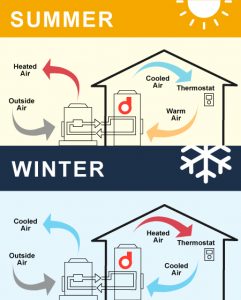Everything You Need to Know About A Heat Pump
Want to learn more about heat pumps and how they operate? Our heating and cooling professionals break down everything you need to know about heat pumps.
What Is A Heat Pump?
A heat pump is a component of a heating and cooling system that is typically installed outside of your home or building. As the name suggests, a heat pump transfers or pumps heat from one place to another, so heat is not generated, but rather it is moved. Similar to an air conditioner, heat pumps can cool your home during warmer months and heat it during cooler months. The only difference is that in heat pumps, we have a reversing valve that allows us to choose to move the heat from inside to outside (cooling mode) or to reverse the cycle and remove the heat from outside to inside (heating mode).
How Does A Heat Pump Work?
 Heat pumps are two-component appliances that use refrigeration and electricity to heat and cool spaces. The first component of a heat pump is a condensing unit that creates heat and cool air. This is the unit that you find outside of a building. The second component is the indoor unit that passes the hot or cold air into the space. These two components are connected by a refrigerant line that heats and cools air as it passes through.
Heat pumps are two-component appliances that use refrigeration and electricity to heat and cool spaces. The first component of a heat pump is a condensing unit that creates heat and cool air. This is the unit that you find outside of a building. The second component is the indoor unit that passes the hot or cold air into the space. These two components are connected by a refrigerant line that heats and cools air as it passes through.
How Does A Heat Pump Cool Air?
When cooling a space, the heat pump absorbs heat from inside a space and releases it outdoors. At the beginning of the cycle, the refrigerant is in a liquid form and is very cold. As it enters the evaporator coil located inside your house, the hot air within moves over the coil and the air starts to lose its heat and cool down. After the refrigerant leaves the indoor evaporator coil it absorbs heat and becomes gas. The refrigerant enters the compressor in the indoor unit which mechanically pressurizes the gas. This process increases its temperature so the refrigerant will leave the compressor as hot gas.
Next, the refrigerant moves to the condenser coil located outside the house. Because the temperature outside is lower than the temperature of the hot gas, the heat is transferred from the refrigerant in the coil to the outside air. As the temperature of the refrigerant gas cools it will form liquid condensate.
The refrigerant leaves the outdoor condenser coil as warm liquid and is moved to the metering device, which drops the pressure and temperature of the warm liquid. The refrigerant leaves the metering device as a cold liquid, ready to repeat the cycle again.
How Does A Heat Pump Heat Air?
As mentioned, heat pumps move heat and air from one place to another. The heating process is a similar process as cooling the air, just in reverse. Heat is taken from the air outside of your home or building and transferred to the refrigerant coolant line. From here, heat from the outside air is absorbed by the refrigerant which is then pressurized to increase the temperature. When the refrigerant is pumped back into your living space it is distributed as warm air.
What Are The Benefits Of A Heat Pump?
Heat pumps have a number of advantages other than the ability to heat and cool a space.
1. Efficiency Rate
Because heat is moved from one place to another instead of being generated, heat pumps are much more efficient than other units. This efficiency in turn can save you money down the line.
2. One Unit
Heat pump’s two-in-one system is a favorite advantage for many who look into them. These units are especially effective in areas with mild winters because you do not need to purchase both an air conditioner and furnace. Heat pumps also do not rely on duct work, or other internal components to heat or cool a space which is also a big advantage.
3. Provide Consistent Heating And Cooling
Heat pumps create more consistent temperatures within the spaces that they operate. Because there are less components than traditional HVAC systems there are not inconsistent temperatures due to incorrect sizing or maintenance which can sometimes happen with HVAC units.
Visit AAA Your Heat Pump Contractors
For over 50 years, AAA Heating and Cooling has provided heating and cooling solutions for Pacific Northwest business owners and residents. We can do the same for you! Contact us today to learn more about heat pump solutions for your property.
For more information read our commercial heat pump resources or visit our commercial heat pump services page.